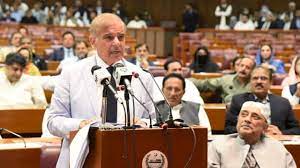ISLAMABAD: Pakistan Prime Minister Shehbaz Sharif on Tuesday said that “history would not forgive us” if Parliament did not enact laws to curtail the powers of the chief justice (CJ), a day after two Supreme Court judges questioned the suo motu powers of the country’s top judge.
Addressing the joint session of parliament, Sharif talked at length about the dissenting judgement by Justice Mansoor Ali Shah and Justice Jamal Khan Mandokhail of the Supreme Court, who lashed out at the unlimited authority of the Chief Justice to take a suo motu (on its own) action on any issue and constitute benches of choice to hear different cases.
Their judgment was about the case of suo motu notice taken by Chief Justice Umar Ata Bandial on February 22 about elections in Punjab and Khyber Pakhtunkhwa provinces. Speaking passionately about the need for new laws to limit the chief justice’s power, Sharif said that if the legislation were not passed, “history would not forgive us”.
Meanwhile, Pakistan’s Cabinet has reportedly approved the draft of a legislation on Tuesday seeking to curtail the discretionary powers of the Chief Justice of Pakistan, The Express Tribune newspaper reported.
The bill, a copy of which is available with the newspaper, says that a committee of the three senior-most judges of the Supreme Court would decide on any suo motu case being taken up by the apex court under Article 184 (3) of the Constitution.
The suo motu power is based on the original jurisdiction of the court under Article 184 of the Constitution. However, its usage over the years has created an impression of partiality on the Chief Justices’ part.
It was openly challenged for the first time by the two judges who were part of a bench that, in its 3-2 majority decision of March 1, directed the Election Commission of Pakistan (ECP) to consult with President Arif Alvi for polls in Punjab and Governor Ghulam Ali for elections in Khyber Pakhtunkhwa.
The five-member bench was reconstituted by Bandial, who took a suo motu action against the delay in elections and initially formed a nine-member bench to deal with the issue. However, two of the nine judges differed with the decision to take suo motu notice, while two other judges recused themselves, prompting the Chief Justice to form a new bench.


